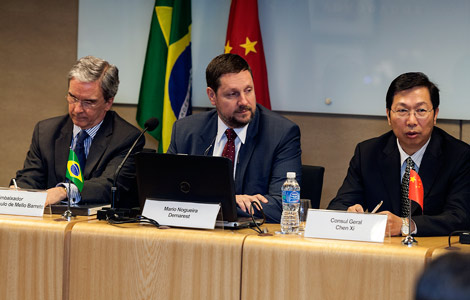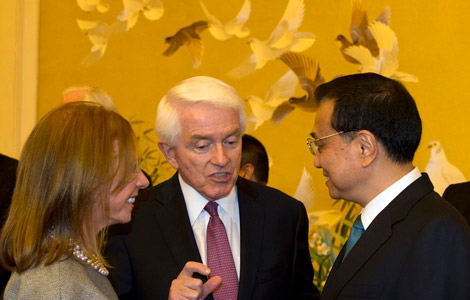China, Argentina boost ties
Updated: 2014-07-20 01:18
By ZHANG YUWEI in New York (China Daily USA)
|
||||||||
 |
|
Argentine President Cristina Fernandez de Kirchner poses in front of the train cars that purchased from China's CSR Qingdao Sifang Co Ltd on May 22, 2013 in Buenos Aires, Argentina.[Photo/Xinhua] |
Chinese President Xi Jinping arrived in Buenos Aires, Argentina, Friday on the second leg of his four-nation South America trip, which will help expand economic ties between China and the Latin American region, experts say.
China and Argentina signed cooperation deals ranging from investment to infrastructure and finance during the Chinese president's visit.
In addition, Argentina also signed deals to borrow $7.5 billion from China on Friday.
Argentina defaulted on its debt in 2001 and had two debt restructuring deals in 2005 and 2010, to restructure its private debt and give creditors a portion of what they were owed.
China also agreed to grant a loan to help finance a postponed railway project that would make it more efficient to transport grains from Argentina's agricultural plains to its ports.
Xingqiang He, associate professor at the Institute of American Studies at the Chinese Academy of Social Sciences and visiting scholar with Center for International Governance Innovation in Canada, said China can provide capital to projects in Latin America, which can create a "win-win" outcome.
"China has huge foreign reserves and the availability of capital is a huge problem Latin America countries are facing," He said. "In that case, a win-win result could be expected.
The Chinese president's South America visit — his first since taking office last year — is seen to enhance relations with the region and to promote economic exchanges.
On Thursday in Brasilia, during Xi's meeting with his Brazilian counterpart Dilma Rousseff, they witnessed signings of a number of agreements including China's import-export bank's loan of $5 billion over three years to Brazilian mining powerhouse Vale, which has iron ore trade with China. The two nations also signed a cooperation agreement for railway projects.
"Brazil and Argentina are China's two largest suppliers of agricultural goods in the region and they are large economies, but, in addition, Brazil is a dominant political power in the region," said Ariel Armony, director of the University of Miami's Center for Latin American Studies.
The two sides will hold a dialogue on economic cooperation and strategic coordination, and Chinese business leaders will hold a forum on economy and trade with their Argentine counterparts, added the ambassador.
Since China and Argentina established diplomatic ties 42 years ago, the two nations have conducted frequent high-level exchanges and reaped tangible fruits in economic and trade cooperation.
Argentina is the second major trading partner of China in Latin America after Brazil. Bilateral trade reached $14.8 billion in 2013, up 2.8 percent from a year earlier. China is Argentina's second-largest trading partner, No 1 destination of agro-product exports, and third-largest source of investment, while Argentina is China's fifth-largest trading partner in South America and third-largest source of agro-product imports in the world. Different from other Latin American countries which export mainly minerals and crude petroleum to China, about half of Argentina's exports were soybeans.
In 2010, China's direct investment in Argentina reached $219 million. Chinese firms have been investing in all different sectors in the country. Sinopec has invested in oil exploration in southern Argentina; Chinese technology firms Huawei, ZTE and Lenovo are building plants in Tierra del Fuego; and Industrial and Commercial Bank of China bought 80 percent of the country's Standard Bank. In addition, the volume of private Chinese investment in Argentina surpassed $6 billion.
He said China expanding its investment in South America marks the beginning of establishment of enhanced substantial relations with countries in the region.
"China has focused more on investment, especially the infrastructure investment on railway, telecommunication and other projects, as well as investment in the banking sector, compared to its main goals on enlargement of bilateral trade, investment in energy and natural resources, especially oil and natural gas, in previous years," He noted.
yuweizhang@chinadailyusa.com

 Brazil launches China desk to handle economic ties with China
Brazil launches China desk to handle economic ties with China
 NY Wheel reels in Chinese EB-5 investors
NY Wheel reels in Chinese EB-5 investors
 The Penguins of Madagascar to enter China
The Penguins of Madagascar to enter China
 Panda cub Bao Bao turns one
Panda cub Bao Bao turns one
 HK kid's symphony returns to NY
HK kid's symphony returns to NY
 China, US reach agreement
China, US reach agreement
 40 bodies from jet returned to Dutch soil
40 bodies from jet returned to Dutch soil
 Dance troupe's fusion performance wins over judges
Dance troupe's fusion performance wins over judges
Most Viewed
Editor's Picks

|

|

|

|

|

|
Today's Top News
Manufacturing hits an 18-month high
Transformers producers hit with breach of contract suit
US chipmaker to be deemed monopoly
Chinese still seek Beckel termination
One dead in shooting in Philadelphia
France: Air Algerie plane 'probably' crashed
TransAsia crash while landing in Taiwan
China, UC-Davis set up food safety center
US Weekly

|

|






